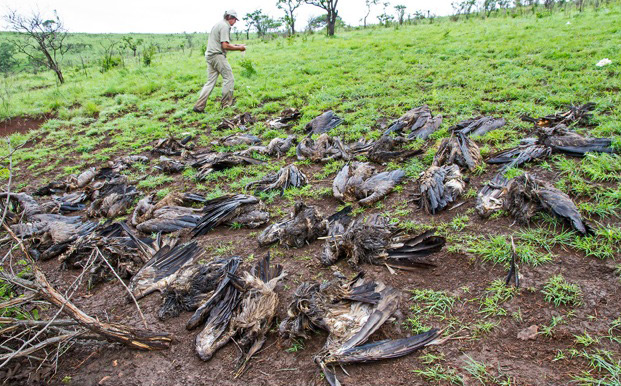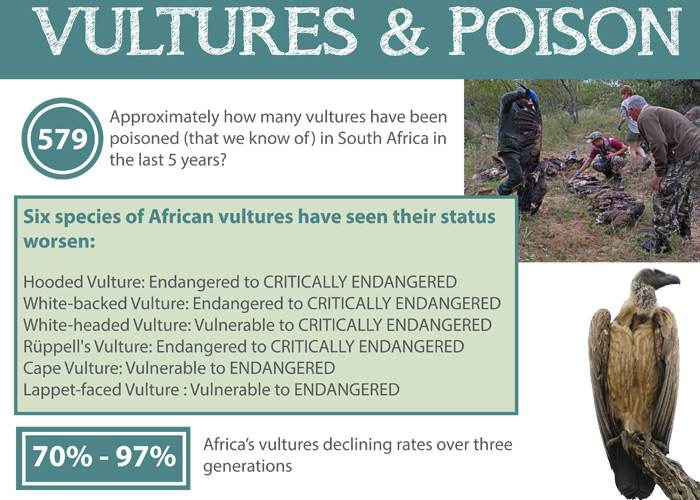On Monday, 2nd May, a report of vulture poisoning on a farm in the Dundee district of South Africa was received. A Raptor Rescue Rehabilitation Centre (RRRC) team was dispatched from Pietermaritzburg with the necessary first aid medicine and equipment.
The team arrived on the scene where one dead Critically Endangered African white-backed vulture (Gyps africanus) and four Endangered live Cape vultures (Gyps coprothreres) were found. The symptoms exhibited by the birds and other signs at the scene confirmed suspicions that the birds likely suffered from poisoning after eating carrion laced with an unknown chemical.
Thanks to an intensive search involving staff from the Endangered Wildlife Trust, RRRC, a bird rehabilitation volunteer from Newcastle, the air-wing of the Ezemvelo KwaZulu-Natal Wildlife Honorary Officers, the Stock Theft Unit of the SAPS and the landowner over the following two days, a single live and a further eight dead African white-backed vultures were recovered from the site, bringing the total number of vultures involved to 14.
Thanks to the fast action of the landowner reporting the incident and the rescue team on the ground, all five vultures taken in for treatment were stabilised and expected to fully recover from the poisoning. One of the Cape vultures had also, however, suffered a broken wing and required additional treatment for this injury. The other birds have already been moved to recovery enclosures and are expected to be released as soon as their condition allows.
The indiscriminate use of poison is one of the major causes of the current decline in vulture populations across most of Africa. Africa’s vulture populations cannot sustain losses such as this, and the current decline may well have serious ecological and human health consequences in the longer term. At least 294 vultures are known to have been killed through poisoning in South Africa since January 2016. Considering the relatively small populations of these birds in the country, losses of this scale cannot be sustained. The Zululand region of KwaZulu-Natal has been identified as a known vulture poisoning hotspot, and vulture populations in this area have declined substantially over the last 15 years, primarily due to poisoning and the illegal harvest of these birds for use in muthi (traditional medicine).

Quick action and an organised approach when incidents of this nature occur are essential to ensure that the impact on vultures and other species is minimised and to gather as much information as possible from the scene to enable law enforcement to pursue and prosecute those responsible. The EWT’s Birds of Prey Programme is working with various African partners to address this threat. This includes training in poisoning incident intervention and investigation methods to reduce the impact of poisoning events and support effective law enforcement and prosecution of perpetrators of these acts. The training also provides guidance regarding contingency planning and preparation for such incidents.

At this stage, the exact source of the poisoning or substance used to poison these birds has not been determined. The case is under investigation by the SAPS Glencoe Stock Theft Unit, and members of the public who can provide information in this regard are asked to please contact Warrant Officer Stephen Brown by calling 0828808629.

To comment on this story: Login (or sign up) to our app here - it's a troll-free safe place 🙂.![]()






